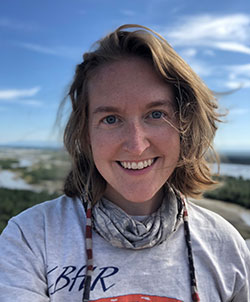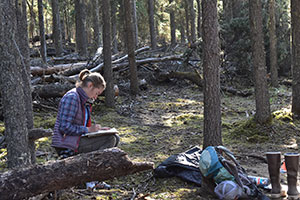
Contact Us
Institutional Communications
Bureau of Mines Building, Room 137
Laramie, WY 82071
Phone: (307) 766-2929
Email: cbaldwin@uwyo.edu
UW’s Doering Honored for Research on Human Migration
Published February 08, 2023

Briana Doering
Briana Doering, a University of Wyoming assistant professor of archaeology, has been honored for her research regarding the circumstances surrounding the migration of Dene/Athabascan people from Alaska and the Yukon to as far south as Arizona some 1,500 years ago.
Doering received the Tübingen Early Prehistory and Quaternary Ecology Prize from Germany’s University of Tübingen. The distinction honors her thesis titled “Evaluating the Social and Environmental Processes of the Athabascan Migration.” Judges praised the study as an example of rigorous hypothesis testing using multiple analytic methods, guided by an explicit theoretical framework.
Doering used archaeological, linguistic, genetic and oral history data in her doctoral thesis to develop a new theory regarding the migration of Dene/Athabascan populations. For many decades, it was believed that a volcanic eruption drove Dene/Athabascan people away from their homes and into new environments thousands of kilometers away.
Doering challenges the very premise of the explanation, noting that archaeologists are quick to see environmental factors as catalyzing major change. She hypothesizes that social factors, such as group reorganization related to the kinship structure, led to population growth and the eventual migration of Dene/Athabascan groups south.
Doering excavated four archaeological sites, with five separate time components marking before and after the volcanic eruption. At each of the sites, she conducted a thorough lithic analysis to see if, and how, tool production and raw material selection changed. She also analyzed isotopes from lipids from hearths and integrated these data with information from fauna studies to understand the composition of the human diets at that time. She carried out a large metadata analysis from two huge radiocarbon databases -- one from the United States and one from Canada -- to see how landscape use changed relative to the number and size of sites.

Briana Doering, a UW assistant professor of archaeology, conducts fieldwork in
central Alaska, where her studies include Indigenous archaeology and human-animal
relationships. (Sarah Allaun Photo)
Overall, Doering found that, leading up to the Dene/Athabascan migration, many changes had been gradually occurring over hundreds of years. Stone toolkits became more specialized, and the populations intensified their use of both upland and lowland resources. Fishing became more important. Doering also explored the kinship structures of Dene/Athabascan groups and determined that changes in social organization could explain the population growth.
Doering received her B.A. in anthropology from Barnard College of Columbia University, then moved on to the University of Michigan, where she earned her M.A. in anthropological archaeology in 2016 and her Ph.D. in 2020. She joined the faculty of UW’s Department of Anthropology in 2021.
Her main research area is in Alaska, working on topics such as migration, Indigenous archaeology, human-animal relationships, spatial organization, resilience and adaptation.
Contact Us
Institutional Communications
Bureau of Mines Building, Room 137
Laramie, WY 82071
Phone: (307) 766-2929
Email: cbaldwin@uwyo.edu
